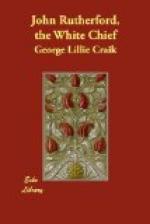distant, where the heads may still be seen.
When the party is a prisoner taken in war, he is eaten immediately, and on the spot. Whether dead or alive he is equally eaten, and it is usual even to drag the bodies from the graves, and, after disinterring them, to eat the flesh. This only in cases of war. From the clear and concurring testimony of all parties, it is certain that it is the practice not to kill the victim till the whole of the flesh cut off by the party is eaten, should he live so long; the chief or party injured then comes forward and cuts off the head, which he carries home as a trophy. Within the last three years there have been two instances of this kind of punishment within ten miles of Tappanooly, and the heads are still preserved. In cases of adultery the injured party usually takes the ear or ears; but the ceremony is not allowed to take place except the wife’s relations are present and partake of it. In these and other cases where the criminal is directed to be eaten, he is secured and kept for two or three days, till every person (that is to say males) is assembled. He is then eaten quietly, and in cold blood, with as much ceremony, and perhaps more, than attends the execution of a capital sentence in Europe.
The bones are scattered abroad after the flesh has been eaten, and the head alone preserved. The brains belong to the chief, or injured party, who usually preserves them in a bottle, for purposes of witchcraft, &c. They do not eat the bowels, but like the heart; and many drink the blood from bamboos. The palms of the hands and the soles of the feet are the delicacies of epicures. Horrid and diabolical as these practices may appear, it is no less true that they are the result of much deliberation among the parties, and seldom, except in the case of prisoners in war, the effect of immediate and private revenge. In all cases of crimes, the party has a regular trial, and no punishment can be inflicted until sentence is regularly and formally passed in the public fair. Here the chiefs of the neighbouring kampong assemble, hear the evidence, and deliberate upon the crime and probable guilt of the party; when condemned, the sentence is ratified by the chiefs drinking the tuah, or toddy, which is final, and may be considered equivalent to signing and sealing with us.
I was very particular in my inquiries whether the assembly were intoxicated on the occasions of these punishments. I was assured it was never the case. The people take rice with them, and eat it with the meat, but no tuah is allowed. The punishment is always inflicted in public. The men alone are allowed to partake, as the flesh of man is prohibited to women (probably from an apprehension they might become too fond of it). The flesh is not allowed to be carried away from the spot, but must be consumed at the time. I am assured that the Battas are more attached to these laws than the Mahomedans are to the




